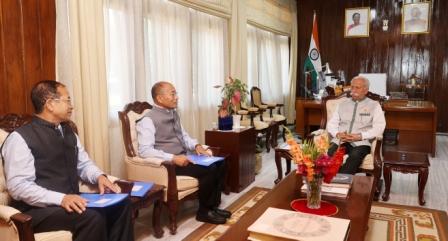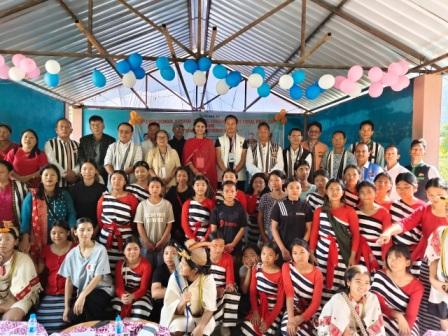-
Arunachal to hold Panchayat, municipal bodies election on Dec 15…
-
 State Election Commissioner calls on Governor
State Election Commissioner calls on Governor
-
 DC inaugurates school amenity
DC inaugurates school amenity
-
AAPSU women’s wing conducts awareness drive for schoolgirls in Pakke-Kesang
-
Governor extends National Press Day greeting
-
PM Modi virtually lays foundation of Eklavya Model Residential School…
-
 ULFA cadre surrenders during joint operation by security forces
ULFA cadre surrenders during joint operation by security forces
-
Raj Bhavan celebrates State Foundation Day of Uttarakhand, Jharkhand
-
Acheso celebrates Janjatiya Gaurav Diwas
-
DC inspects strategic Panggo-Jorging Defence Road
ES Reporter
ITANAGAR, Mar 5: The State Cabinet, under the chairmanship of Chief Minister Pema Khandu, has approved three crucial policies aimed at transforming the horticulture, agriculture and tourism sectors in Arunachal Pradesh. These policies, designed with a long-term vision, focus on sustainable growth, infrastructure development, and economic empowerment, ensuring that the state remains at the forefront of agricultural and tourism advancements.
Addressing the media, government spokesperson and Parliamentary Affairs Minister Pasang Dorjee Sona stated that the policies were thoroughly discussed during the Cabinet meeting, with extensive deliberations on their roadmaps, budgetary allocations, and latest technological interventions. He emphasized that these initiatives would boost local employment, strengthen the rural economy, and enhance the state’s overall productivity and revenue generation.
The Arunachal Pradesh Horticulture Policy 2025-35 has been framed to increase production and productivity while promoting sustainable and climate-resilient horticulture practices. It focuses on infrastructure development across the value chain, branding and marketing, human resource development, and research and innovation. Special initiatives under the policy include the Arunachal Kiwi Mission, aimed at making the state a key player in India’s kiwi production, the Arunachal Spice Mission, which seeks to harness the potential of high-value spices like large cardamom, black pepper, and turmeric, and the Arunachal Medicinal & Aromatic Plants (MAP) Mission, which will promote large-scale cultivation of medicinal plants for the AYUSH industry. Additionally, the policy lays strong emphasis on empowering women and young farmers, encouraging them to adopt horticulture as a sustainable livelihood through skill development and financial support. A major focus has also been placed on sustainable and climate-resilient farming, integrating environmentally friendly practices and discouraging indiscriminate chemical use.
Meanwhile, the New Agriculture Policy – Arunachal Pradesh 2025-35 has been designed to integrate modern technologies and strategic interventions to address challenges in agriculture and enhance productivity. The policy aims to expand cultivable land through land terracing and conversion of jhum cultivation into permanent farming, improve irrigation facilities, and promote water harvesting and conservation techniques. The introduction of certified seeds, high-yield crop varieties, and farm mechanization will further support increased productivity. The policy also encourages contract farming and Agri-startups, engaging educated youth in agriculture-based enterprises. Community farm-fencing will be introduced to mitigate crop damage by wild and domestic animals, while market linkages will be strengthened through digital platforms like e-NAM and regular buyer-seller meets. Additionally, the policy prioritizes research and development, the use of drone technology and AI in farming, and enhancing agricultural data collection through digitization. Sona highlighted that the policy was formulated after extensive field visits and consultations with district-level officers, KVKs, PRI members, farmers, SHGs, and FPOs, ensuring that it addresses the real needs of the agricultural community.
The Arunachal Pradesh Tourism Policy 2025-30 is a comprehensive framework aimed at developing holistic and sustainable tourism in the state. With a strong emphasis on enhancing infrastructure and connectivity, the policy envisions the expansion of road networks, digital tourism platforms, and eco-friendly accommodations. It also promotes niche tourism segments such as eco-tourism, adventure tourism, farm tourism, and spiritual tourism, aiming to showcase Arunachal Pradesh as a premier travel destination. Key initiatives include the promotion of farm and agro-tourism, where tourists can experience organic farming and rural life, the development of wine tourism, which will boost local fruit-based wine industries like kiwi and guava, and the establishment of spiritual circuits, connecting historic sites like Tawang Monastery, Chumi Gyatse, and Parshuram Kund. The policy also focuses on adventure tourism, promoting activities like trekking, rafting, and paragliding, and the development of hot water springs for wellness tourism, integrating traditional healing therapies.
According to PD Sona, the tourism policy is aligned with the Atmanirbhar Bharat vision, fostering local skill development, entrepreneurship growth, and self-reliance in the hospitality sector. By encouraging homestays, handicraft production, and rural tourism, the government aims to generate direct and indirect employment opportunities while ensuring that tourism remains sustainable and eco-friendly. With increasing tourist footfall, the policy is expected to contribute significantly to the state's revenue generation and local economy.
The Cabinet's approval of these three transformative policies marks a significant step toward sustainable development, economic empowerment, and modernization in Arunachal Pradesh,added Sona.

Kenter Joya Riba
(Managing Editor)She is a graduate in Science with post graduation in Sociology from University of Pune. She has been in the media industry for nearly a decade. Before turning to print business, she has been associated with radio and television.
Email: kenterjoyaz@easternsentinel.in / editoreasternsentinel@gmail.com
Phone: 0360-2212313

